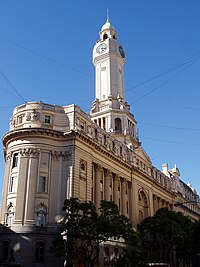Buenos Aires City Legislature
|
Buenos Aires City Legislature Legislatura de la Ciudad de Buenos Aires |
|
|---|---|
 |
|
| Type | |
| Type | |
|
Term limits
|
4 years |
| History | |
| Founded | 1996 |
| Leadership | |
|
President
|
|
|
1st Vice-President
|
Carmen Polledo, PRO
|
| Structure | |
| Seats | 60 deputies |
 |
|
|
Political groups
|
|
| Meeting place | |
 |
|
| The Legislature Palace of Buenos Aires. | |
| Website | |
| www |
|
The Buenos Aires City Legislature (Spanish: Legislatura de la Ciudad Autónoma de Benos Aires, commonly known as the Legislatura Porteña) is a central part of the Government of the City of Buenos Aires, Argentina. It is housed in the Palacio de la Legislatura de la Ciudad de Buenos Aires, an architectural landmark in the city's Montserrat section.
The internecine warfare between those who favored a united Argentina with a strong central government (Unitarios) and Buenos Aires Province leaders who favored an independent nation of their own (Federales) dominated local political life in the decades following the Wars of Independence and led to the 1880 Federalization of Buenos Aires. Pursuant to this new policy, in 1882 President Julio Roca signed National Law 1260, which created the presidential prerogative of the appointment of the Mayor of Buenos Aires, as well as a city council by way of compromise towards the put-upon local gentry.
The newly formed city council (Consejo Deliberante) originally included 30 Concejales elected via male suffrage (though this excluded the city's immigrants, which made up a majority of voting-age males at least as late as 1914). The body first met during the tenure of Mayor Torcuato de Alvear, with whom a precedent for a productive relationship was established by cooperating on an unprecedented urban planning a renewal agenda. The council's resolution in 1921 for new grounds befitting a governing body of what had become one of the world's most prosperous cities was likewise approved by the Mayor at the time, José Luis Cantilo. A lot to the southwest of the Plaza de Mayo was set aside for the new building's construction, and was inaugurated on October 3, 1931.
...
Wikipedia
